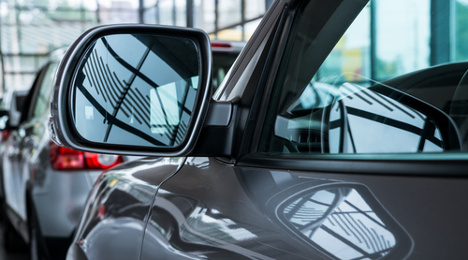Larry H. Miller Dealerships recently acquired a Nissan store in Denver, making the city the group’s largest market outside of its Salt Lake City headquarters.
The Nissan store is located at 2400 W. 104th Avenue in Denver and has been renamed Larry H. Miller Nissan 104th.
This purchase follows four years of continued growth within the Denver market, according to the group.
LHM currently employs more than 1,000 individuals at 13 Colorado locations.
Timeline of Colorado expansion
LHM's Larry H. Miller began his career in Denver as a parts salesman in 1970. By 1987, he opened Larry H. Miller Toyota Boulder, followed by Larry H. Miller Liberty Toyota Colorado Springs a year later and Larry H. Miller Toyota Colorado Springs in 1992.
In the new millennium, the group opened Larry H. Miller Volkswagen Lakewood and Larry H. Miller Nissan Highlands Ranch in 2001 and 2006, respectively.
Larry H. Miller Chrysler Dodge Jeep Ram 104th in Thornton and Larry H. Miller Ford Lakewood opened in 2014. The next year, the group founded the Larry H. Miller Ram Truck Center in Federal Heights.
Last year, LHM returned to the Denver market to open Larry H. Miller Dodge Ram Cherry Creek, Larry H. Miller Colorado Chrysler Jeep and Larry H. Miller Fiat Denver in Aurora; and Larry H. Miller Nissan Southwest in Littleton.
LHM currently operates 61 dealership locations under 20 different automotive brands in seven Western states.
Consumers’ loyalty to midsize sedans is currently strong and shopper interest across all luxury SUV/CUV segments is up 2 percent from April, according to Jumpstart Automotive Media’s latest shopper interest data report.
Interest in midsize sedans across Jumpstart’s portfolio of sites is up for the second consecutive month, rising by 4 percent during April and May.
Jumpstart’s May report determined 49 percent of midsize sedan shoppers surveyed by the company are exclusively researching vehicles in this category.
“As shopper interest in SUVs and CUVs has grown exponentially over the past few years, luxury auto brands have been expanding their lineups to include more size, feature, and pricepoint options. And we’re seeing that these brands are now experiencing broad audience appeal,” Jumpstart marketing and strategic insights vice president Libby Murad-Patel said in a news release.
“We are also interested to see that midsize sedans — a segment that had the fifth largest loyalty decrease in 2015 – 2016 (down 11 percent) — has seen loyalty grow every month this year. As loyalty continues to be a challenge, especially amidst the growth in SUV and CUV options, this is impressive.”
Behind Ford and Chevrolet, holding its rank as the third most-shopped brand, Toyota gained 6-percent share last month.
Toyota saw success among some of its core and newer models such as the Camry, RAV4 and C-HR.
Fellow Japanese brand, Mazda, also gained 6 percent share in May, the automaker currently ranks eighth among of all brands researched on Jumpstart sites.
The report broke down Toyota & Mazda growth trends in May:
— Camry (+8%, rank 17)
— RAV4 (+16%, rank 32)
— Corolla (+15%, rank 55)
— C-HR (+89%, rank 104)
— 86 (+41%, rank 136)
— Yaris iA (+19%, rank 248)
— CX-5 (+7%, rank 13)
— MX-5 Miata (+18%, rank 14)
— CX-9 (+20%, rank 26)
— 6 (+17%, rank 77)
— CX-3 (+4%, rank 85)
Jumpstart's May report is based on the shopping behavior of more than 17 million car shoppers who are researching vehicles across the company’s portfolio of automotive publishers.
In celebration of its new headquarters in Long Island’s Village of North Hills, Dealertrack was set to hold a ribbon-cutting ceremony on Wednesday afternoon for the project’s team members and contributors with state and local officials.
The 10-acre LEED-specified headquarters with a 230,000-square-foot facility is set to be home to roughly 600 team members early next month.
“When Dealertrack originally announced the new building plan three years ago, it was a vision driven by our team members to have a work environment that inspired innovation and collaboration, and overall health and wellness in the workplace,” Dealertrack senior vice president of finance and operations Dean Tilsley said in a news release. “As we have grown over the years, we have done so with an unwavering commitment to the Long Island metro area.”
With a 17-year lease, Dealertrack is committed to remaining in Long Island, according to the company.
“As mayor, I welcome Dealertrack to the Village of North Hills. I am pleased to participate in the ceremonial ribbon cutting for the state-of-the-art building that will serve as the headquarters for this fine company,” Village of North Hills Mayor Marvin Natiss said in the release.
The new facility features indoor basketball and volleyball courts, a cafe, cardio room and yoga studio, indoor and outdoor dining areas, game rooms and a walking trail.
TRITEC Real Estate Company, which served as construction manager for the project, partnered with Castagna Realty as the new headquarters' real estate developers.
“TRITEC Development, LLC, in partnership with Castagna Realty, is proud to have conceived and created this landmark headquarters facility, providing a cutting-edge, amenity-rich environment that will allow Dealertrack to continue to build one of Long Island's most talented teams in the tech industry,” TRITEC Principal Jim Coughlan said.
We appreciate the cooperative efforts of the Village of North Hills, as well as the empowering investments from both the New York State Empire State Development Corp. and the Nassau County IDA; this structure stands as testimony to the success of the public investment in local economic development.”
Spector Group oversaw the building envelope and Combined Resources designed the interior spaces, according to Dealertrack.
“For 51 years, Spector Group has built many landmarks on Long Island. Dealertrack joins the architectural landscape as an icon at the gateway to the Long Island peninsula,” said Spector Group Principal Marc Spector. “It is a fresh, unique design for Long Island and the tri-state area. We believe this design reflects the energy and growth of Dealertrack and we're delighted to be adding such a distinctive structure to Long Island's rich architectural legacy.”
The new headquarters is located at 3400 New Hyde Park Road in New Hyde Park, N.Y.
“We are proud to offer our team members a state-of-the-art facility where they can continue to develop solutions that are changing the way the world buys and sells vehicles, and also contributes to local economic prosperity,” Tilsley added.
Off-lease vehicle volume is rising, used-vehicle prices are falling and Brian Benstock, vice-president of Paragon Honda and Paragon Acura, counts it all opportunity.
He’s looking forward to selling or leasing new vehicles to consumers when their leases expire and plans to buy a lot of those lower-mileage, off-lease vehicles for his thriving certified used-vehicle operations.
And though the industry expects a glut of off-lease vehicles to put downward pressure on new- and used-vehicle prices in the coming months, Benstock said it’s just “normal” market “ups and downs.” Honda and Acura residuals are holding up well, he adds.
“I’m excited about a lot of cars coming off-lease. Those cars need to be replaced, so there’s an opportunity to sell more new cars,” said Benstock who expects his Woodside, N.Y., dealerships to this year exceed the 3,012 certified used Hondas and 1,048 certified used Acuras they sold in 2016.
“And if the value drops on used cars, we’re going to pay less for them and that will create a value for the potential buyer. I’m bullish on the fact there are more off-lease cars.”
Price pressure
Edmunds estimates that 3.5 million off-lease vehicles will return to the market this year and the number will grow to 3.9 million in 2018 and to 4.2 million in 2019. That’s up from 2.5 million in 2015 and 3.2 million in 2016. That added volume is exerting downward pressure on prices of late-model, used cars and trucks.
For example, from the first quarter of 2010 to the first quarter of 2017, the average value of 3-year-old used vehicles increased 8.7 percent while the original MSRP of 3-year-old vehicles grew 14.7 percent in the same time period, according to Edmunds.
Lower used-vehicle prices can make it harder and more expensive for consumers who owe more on their trade-in than it’s worth to get auto loans.
Ivan Drury, senior analyst at Edmunds, said “42, 43 percent” of all new-car buyers have trade-ins and of that number, at least 25 percent owe an average of $5,000 more on their current vehicles than they are worth.
He said the overall percentage of buyers saddled with negative equity “is not overwhelming but what is so scary is that the (dollar) amount is so high.”
So far, interest rates are not a problem for dealers seeking financing for their customers because the increases have been small and most of the credit tightening is at the subprime level.
But Doug Wolford, vehicle exchange and lease manager at Oxmoor Toyota in Louisville, Ky., keeps his eye on interest rates and overall economic conditions such as housing and healthcare costs, anyway.
“It’s been 5 or 6 years since we’ve seen rates we’re going to be seeing in the next 12 to 18 to 24 months,” Wolford said. “I get credit apps on 95 percent of my customers and I listen to them. Student loan debt is a killer.”
CPO “maturing”
For years, off-lease vehicles have been the bread-and-butter of manufacturer-backed certified used-vehicles programs. But those sales are “maturing” and “not growing as fast” as they did in previous years, cautions Anil Goyal, senior vice president of automotive valuation and analytics at Black Book.
Incentives are lowering new-vehicle transaction prices so close to the prices of certified used vehicles that many consumers are opting for new instead of used, Goyal said.
“We are in a market that has plateaued and declining in many respects,” Goyal said. “Certified will tick up a little bit this year but it will be under the 5 percent.”
Even so, used-vehicle prices are high and Benstock believes CPO sales have room to grow.
“There is strong demand for used cars,” he said. “There is a significant portion of the dealer body not participating in certified programs, and remember there is several times the number of used cars are sold in the nation as new cars. Until we get that certified number closer to one-to-one with new, I think we still have a lot of room for growth.”
Todd Caputo, owner of Sun Chevrolet in Chittenango, N.Y., is already seeing his new-vehicle sales slowing down.
But he anticipates stocking more and lower-priced off-lease vehicles at his Chevy store and his two used-car dealerships.
To aid the effort, he’s building a new dealership in Cicero, N.Y., to replace his existing Sun Auto Warehouse used-car store. The $6 million, 43,000-square-foot facility will be twice the size of the current store and is to open in November.
His other used-car location is in Cortland, N.Y.
Caputo said his three dealerships retail about 5,000 used vehicles a year.
He added: “Savvy franchise dealers will be able to capitalize on off-lease vehicles and be more profitable with used cars.”
CarStory has released an enhanced version of its Market Reports that is designed to heighten mobile shopper engagement on VDPs, according to the artificial intelligence platform’s creator Chad Bockius.
“The main focus for this release was all about the design, in terms of the look and feel, but more importantly how we represent the analytics that we share and how to optimize Market Reports for mobile shopping,” Bockius said in a phone interview with Auto Remarketing.
“Over three-fourths of consumers today are shopping on their mobile device — both on their couch and on the lot. And as a result of that, it has created a culture of skimmers.”
Because mobile devices have become the primary type of interface for a large majority of the population it is important to make mobile shopping experiences conveniently engaging, Bockius explained.
“They’re going to skim information quickly and we had to address that,” he said.
“We had to create an experience that allows consumers to access and consume the data the way that they want it. Which is just a reality of 2017.”
CarStory Market Reports is now fitted with added additional data elements, such as a feature on the Market Reports home screen where machine learning is used to automatically identify images, according to Bockius,
“Based on our research, we know exactly which images consumers want to see first, and we use that data and our machine learning to process those images to create a collage on the first screen of the Market Report. Which is not just a nice design element, but more importantly it’s giving information to the consumer,” Bockius explained. “It’s not giving them the information over text, it’s giving them information visually, so they can see what features the vehicle has.”
Bockius said CarStory offers dealers three benefits: more engagement, more leads and ultimately more sales.
“In our research, we have found that dealers who have employed Market Reports see a 60 percent decrease in bounce rate. And we have seen a 24 percent increase in lead conversion,” he said.
Bockius believes the dealer VDP should be the best resource for a consumer who is making that decision to buy.
“The more people that you are bringing into the door, the more you are going to be able to sell. If you can’t engage that consumer on the VDP, it’s the equivalent of having that consumer walk off your lot,” he said.
“We have brought all the critical research information directly to bare on the dealers’ VDP to keep those consumers engaged and tell the consumer the whole story, so that ultimately they can make that confident decision to buy.”
CarStory has the largest depository of inventory data in the industry, according to Bockius.
“It’s quite amazing, the amount of science and the amount of data processing that occurs to generate these reports, but at the end of the day our goal is to hide all that to ultimately create a simple summary that consumers can access right on that dealer VDP,” he said. “When we analyze the data, we are looking at a specific vehicle relative to the market competition in a local area. All of our data comes down to two buckets of data we have to sort and analyze the first is all of the market supply data or the actual inventory, so what is available for sale today — that’s part of the data.”
Bockius said consumer demand data, which covers a variety of things, is the second source of CarStory data.
“We look at what consumers are searching for, the vehicles that they are spending their time on, the vehicles they are cross shopping and the features they are looking for,” he added.
Bockius mentioned that Kevin Frye, eCommerce director of Jeff Wyler Automotive Family once told him that with CarStory Market Reports, he can become an instant expert on every car on the lot.
“You can imagine how difficult it is for any salesperson to know the specific, the whole story about hundreds of cars,” he said. "We automate that process for you, we can put that information right in your pocket and you can be an expert whether you’re talking to a consumer on the phone or on the lot instantly, and that is going to help dealers move metal,”
CarStory is completely free to dealers. For more information, about Market Reports or to become a participating dealer, visit dealers.carstory.com.
The American International Automobile Dealers Association went to the White House this week to participate in a meeting on tax reform with White House National Economic Council Director Gary Cohn and other auto industry leaders.
Leading AIADA’s charge were president Cody Lusk, vice president of government relations Rachel Robinson and vice chairman and California dealer Howard Hakes, who all supported the administration's efforts to produce a tax reform plan that promotes economic growth, rewards entrepreneurship and creates a level playing field for all Americans.
"Today's meeting was representative of how deeply the Trump administration cares about American businesses, large and small, and wants to see us succeed," Hakes said. "A tax reform bill that allows business owners to invest in their communities and hire new employees will benefit all Americans. It's refreshing to sit at a table with leaders who 'get it' and are ready to take action.”
During the meeting, attendees discussed a number of aspects of a potential tax reform bill, including the contentious 20 percent Border Adjustment Tax (BAT) that has been proposed in the House of Representatives and is opposed by AIADA.
"America's international nameplate dealers fully support federal tax reform but remain deeply opposed to the BAT provision, which would drive up the cost of every vehicle on their lots by an average of $2,000 per vehicle,” Lusk said.
“We were grateful to have an opportunity to share our perspective with the White House, and we are optimistic that a well-crafted tax reform bill, minus the BAT, can make its way through Congress and to the president’s desk for his signature,” Lusk continued.
A 2017 study by the Center for Automotive Research (CAR) estimates that U.S. light vehicle sales would immediately fall by 5.6 percent following implementation of a border adjustment tax, resulting in a $34.6 billion overall cost to U.S. consumers.
For more information on how a border adjustment tax would impact America’s international nameplate dealers, visit www.aiada.org/bat.
KAR Auction Services chief economist Tom Kontos reported overall wholesale prices in May rose nearly 4 percent year-over-year. But a recent addition to Kontos’ analysis in order to give the industry a better understanding “once again shows significant price softening.”
According to ADESA Analytical Services’ monthly analysis of wholesale used vehicle prices by vehicle model class, wholesale used vehicle prices in May averaged $11,138. The May figure ended up flat compared to April but 3.9 percent relative to May of last year.
Kontos explained that the year-over-year rise came mostly from larger vehicles, including full-size cars, midsize and full-size SUVs/CUVs and full-size pickups. He also pointed out that the year-over-year growth in minivan prices is exaggerated by newer models as discussed in January’s Kontos Kommentary.
“Average wholesale prices in May were flat versus April but up on a year-over-year basis, primarily due to the strength of truck prices and a younger mix resulting from off-lease supply growth,” Kontos said.
“As introduced last month, a drill-down into the data clearly reveals price softening when accounting for sale type and vehicle age, model class and mileage,” he continued.
Kontos again took a look at fleet/lease sales of 3-year-old vehicles with 36,000 to 45,000 miles. He found that May prices for midsize SUVs and CUVs softened by $225 or 1.1 percent year-over-year to settle at $20,225.
The drop-off for midsize cars in this analysis was even steeper as May prices softened by $685 or 5.6 percent to fall below $12,000, landing at $11,595.
“We will continue to monitor and report this information as a supplement to the averages traditionally provided here,” Kontos said while also elaborating in an online video available here as well as at the top of this page.
Elsewhere, Kontos mentioned that average wholesale prices for used vehicles remarketed by manufacturers in May rose 3.3 percent month-over-month and up 4.9 percent year-over-year. Overall May prices for fleet/lease consignors ticked down 0.2 percent sequentially but rose 3.5 percent annually.
Kontos added that average prices for dealer consignors were up 0.2 percent versus April and up 5.9 percent relative to May of last year.
Kontos closed by mentioning data from the National Automobile Dealers Association that indicated May retail used vehicle sales by franchised and independent dealers were down a combined 2.8 percent year-over-year. As also reported by Auto Remarketing, May certified pre-owned sales climbed 7.0 percent year-over-year, according to figures from Autodata.
ADESA Wholesale Used-Vehicle Price Trends
| |
Average |
Price |
($/Unit) |
Latest |
Month Versus |
| |
May 2017 |
April 2017 |
May 2016 |
Prior Month |
Prior Year |
| |
|
|
|
|
|
| Total All Vehicles |
$11,138 |
$11,141 |
$10,718 |
0.0% |
3.9% |
| |
|
|
|
|
|
| Total Cars |
$8,954 |
$8,968 |
$8,952 |
–0.2% |
0.0% |
| Compact Car |
$6,832 |
$6,805 |
$6,835 |
0.4% |
0.0% |
| Midsize Car |
$7,970 |
$7,962 |
$8,045 |
0.1% |
-0.9% |
| Full-size Car |
$8,395 |
$8,504 |
$7,864 |
-1.3% |
6.8% |
| Luxury Car |
$13,765 |
$13,317 |
$13,740 |
3.4% |
0.2% |
| Sporty Car |
$14,313 |
$14,694 |
$14,207 |
-2.6% |
0.7% |
| |
|
|
|
|
|
| Total Trucks |
$13,244 |
$13,187 |
$12,673 |
0.4% |
4.5% |
| Minivan |
$9,117 |
$9,060 |
$7,932 |
0.6% |
14.9% |
| Full-size Van |
$13,005 |
$13,009 |
$13,457 |
0.0% |
-3.4% |
| Compact SUV/CUV |
$10,888 |
$11,083 |
$10,851 |
-1.8% |
0.3% |
| Midsize SUV/CUV |
$11,845 |
$11,773 |
$11,484 |
0.6% |
3.1% |
| Full-size SUV/CUV |
$14,075 |
$14,085 |
$13,502 |
-0.1% |
4.2% |
| Luxury SUV/CUV |
$19,312 |
$19,055 |
$19,175 |
1.3% |
0.7% |
| Compact Pickup |
$9,367 |
$9,326 |
$9,283 |
0.4% |
0.9% |
| Full-size Pickup |
$16,775 |
$16,520 |
$15,857 |
1.5% |
5.8% |
Source: ADESA Analytical Services.
ELEAD1ONE recently announced a partnership with automotive recall news and data provider Recall Masters to integrate real-time vehicle recall lookup data into the company’s lane management application Service1One.
Getting recall status information via the app during the mobile check-in process not only saves time during the initial inspection stage but prevents potential upsets between dealers and their customers, according to ELEAD1ONE.
“Trust can be a hard thing to establish with service customers. To discover that their vehicle needs to stay in longer for a recall repair – or even worse – that they have a recall which the dealership failed to repair, is not exactly great for customer relations,” Recall Masters president Chris Miller said in a news release.
“Our integration with ELEAD1ONE’s Lane Management Application enables the dealership to inform customers about any open recall in real-time while the initial check-in and inspection are done. This then helps build trusting relationships between automotive dealers and their customers.”
The Service1One lane app provides advisors with customer service tools designed to streamline the lane process.
On the app, advisors can quickly access customer appointment information, service history, pricing menus, inspections and real-time recall information.
Additionally, the line items on the RO Summary Estimate can be easily added or removed so that customers always get an accurate quote.
“We all know that service lanes can get hectic. Our aim is to provide dealers with the tools to increase service efficiency and give customers the ultimate service experience,” said ELEAD1ONE partner Bill Wittenmyer. “With the huge level of vehicle recalls, informing customers of any that affect their vehicle can be a major pain point for most auto dealers. Service departments will greatly benefit from real-time recall status information integrated with our Service1One Lane Management App.”
For more information about ELEAD1ONE’s or the Service1One app, visit http://www.elead-crm.com/products/service/automotive-service-management-service1one/.
Dominion Dealer Solutions’ CRM and lead management systems, Autobase and Web ControlTM, are now both premium CRM products for General Motors.
As part of GM’s Dealer Technology Assistance Program (DTAP), Dominion has agreed to complete integration to all available GM DTAP Data service integrations by the end of Q4.
Through DTAP, GM makes its data available in their dealers’ own CRM systems to improve sales, customer experience and customer satisfaction.
"General Motors bestows a Premium product designation on select CRM solutions that provide deep database integrations so dealers can do business as efficiently as possible all in one place," Dominion director of OEM partnerships Ryan Kelly said in a news release. "Dominion is proud that both Web Control and Autobase are recognized as Premium CRM products and have been approved for the iMR Turnkey Vendor Program."
GM dealers who utilize either Dominion Autobase or Web Control can now access GM tools from the client record. Previously, the tools were only accessible from various GM websites and other GM internal systems.
Key integration points that have been enhanced include DCDE Customer Search, VPS – Incentives Offer Management and VPS – GM Credit Card.
The integrations are now available to both Dominion Autobase and Web Control customers at no additional charge.
Additionally, Dominion said over the next several months it will also be adding both its Vehicle Locate Service (VLS) and Vehicle Invoice Service (VIS) for the GM dealers.
Helion Automotive Technologies has a new data security warning for auto dealerships because in recent weeks spear phishing hackers have been busy planting malware inside of social media posts designed to lure employees of organizations to click on the post.
Dealership employees are ideal targets for spear phishers looking to grab Personally Identifiable Information (PII) and bank account information, according to Helion.
"This is the same spear phishing scheme that hackers have been using successfully in targeted email messages for several years now," Helion president and chief executive officer Erik Nachbahr said in a news release. "The problem is that although most employees have been told and know not to click on emails from people they don't know, they don't think twice when it comes to clicking on a message or offer in their Facebook feed. They are more trusting in a social media environment."
If employees take the bait of hackers and click on infected links, malware can be downloaded onto the employee's computer compromising the entire organization's network, the information technology solutions for auto dealers said.
Helion recently conducted a phishing test at an auto dealership by sending emails to 125 employees where three employees took the bait. When prompted by the website the email drove them to, they entered both their usernames and passwords.
If the attack were in fact real, the consequences could cost a dealership thousands, Helion said.
"That test was a good sample that revealed auto dealerships are very vulnerable to this type of attack and need to do a better job at educating their employees," Nachbahr said.
Nachbahr’s tips for preventing a spear phishing attack:
- Instruct employees to never click on links in social media posts and messages from their computers or personal devices while at work
- Require employees to change their network login passwords every 90 days
- Encourage employees to keep social media profiles private and don't accept friend or connection requests from people they don't know
- If employees receive a phone call, email message or social media message from a banking institution, vendor or other entity that asks for personal information, do not give this information verbally or via email, but contact the institution directly
- Get cyber liability insurance, which covers costs associated with a data security breach and loss of data
- Regularly apply software updates to Microsoft Windows, Internet Explorer and all software applications on every PC












